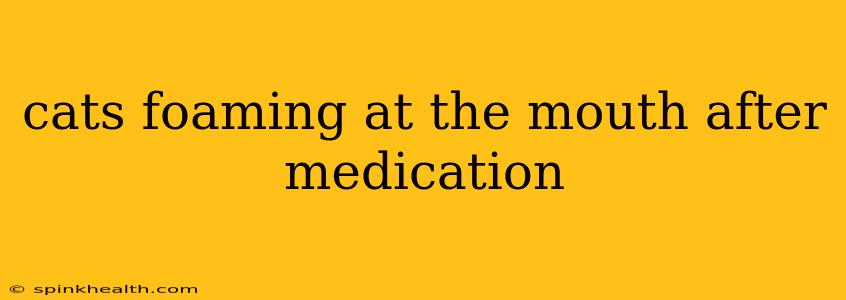Cats Foaming at the Mouth After Medication: A Vet's Perspective
It's a terrifying sight: your beloved feline friend, suddenly foaming at the mouth after receiving medication. Panic sets in, and understandably so. This isn't a normal occurrence, and it requires immediate attention. While there are several reasons why this might happen, it's crucial to understand that it's not something to take lightly. This post explores the potential causes, what to do in an emergency, and how to prevent future occurrences.
My name is Dr. Emily Carter, and I've spent the last 15 years as a practicing veterinarian. I've seen firsthand the distress this can cause both pets and their owners. Let's delve into the possible reasons behind this alarming symptom.
What Causes Cats to Foam at the Mouth After Medication?
This symptom isn't a direct result of all medications, but rather a reaction to specific drugs or a possible underlying condition exacerbated by the medication. Let's break down the common culprits:
-
Adverse Drug Reactions: This is the most frequent cause. Some medications simply don't agree with certain cats, triggering an allergic reaction or an unexpected side effect. This can manifest as foaming at the mouth, along with other symptoms like vomiting, diarrhea, skin rashes, or difficulty breathing. The severity can range from mild to life-threatening.
-
Medication Toxicity: Giving your cat the wrong dosage, administering the wrong medication, or accidental ingestion of human medication can lead to toxicity. This is a serious situation that often presents with foaming at the mouth, tremors, seizures, and even organ failure.
-
Underlying Medical Conditions: Sometimes, the medication isn't the primary issue; instead, it might be highlighting a pre-existing condition. For example, a cat with kidney disease might experience more pronounced side effects from certain medications than a healthy cat.
-
Gastrointestinal Upset: Certain medications can cause nausea and vomiting, leading to excessive salivation which might appear as foaming. This is usually less serious than an allergic reaction or toxicity but still requires veterinary attention.
My Cat is Foaming at the Mouth After Medication - What Should I Do?
This is a medical emergency. Do not delay seeking veterinary care. Here's what you should do:
- Remain calm: Your cat will sense your anxiety, so try to stay composed.
- Note the medication: Identify the medication your cat received, including the dosage and the time of administration. This information is crucial for your veterinarian.
- Contact your vet immediately: Describe the symptoms clearly and follow their instructions.
- Transport your cat carefully: If your vet advises bringing your cat in, transport them safely and gently. Avoid sudden movements.
What Medications Commonly Cause Foaming at the Mouth in Cats?
This is difficult to answer definitively because adverse reactions vary widely between individual cats. However, some medications are more likely to cause such side effects than others. This information is for educational purposes only and should not be interpreted as a recommendation or contraindication for any medication. Always follow your veterinarian's instructions.
Your vet will be able to assess your cat's situation and determine the appropriate course of action.
Can I Prevent This From Happening Again?
Prevention focuses on open communication with your veterinarian.
- Thorough medical history: Ensure your vet has a complete medical history of your cat, including any allergies or pre-existing conditions.
- Clear instructions: Carefully follow your vet's instructions regarding medication administration. Ask clarifying questions if anything is unclear.
- Observe your cat carefully: Monitor your cat closely after medication administration for any signs of adverse reactions.
Foaming at the mouth in cats after medication is a serious issue requiring prompt veterinary attention. By understanding the potential causes and taking swift action, you can help ensure your feline companion receives the best possible care. Remember, prevention through clear communication with your vet is key.

